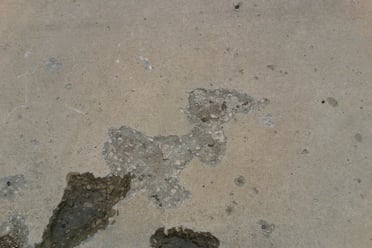Concrete Sealing Can Save You Thousands In Repair Costs
Jeremy Holderness If you've ever had a concrete driveway, sidewalk, or pool deck poured by a professional concrete company then I don't have to tell you how expensive it can be. They have to prepare the area, build the forms, install reinforcing metal, pour the mix, and then finish it so it looks nice and pretty.
If you've ever had a concrete driveway, sidewalk, or pool deck poured by a professional concrete company then I don't have to tell you how expensive it can be. They have to prepare the area, build the forms, install reinforcing metal, pour the mix, and then finish it so it looks nice and pretty.
Before working in the coatings industry I never gave much thought to the need for any maintenance or concrete sealing on flatwork. I mean, I knew you had to paint your house and stain your deck but I guess I just always assumed that concrete was virtually weatherproof.
I used to work for a large commercial construction company when I was young, and even helped with many of their pours. I watched the finishers apply a 'Cure & Seal' product to the surface, which I was told -- as the name would suggest -- was to help cure the concrete and seal it from the weather.
Little did I know that this treatment wasn't enough to protect it long-term. Over the years I've seen first-hand what happens to neglected masonry surfaces, and how many thousands of dollars it has cost unsuspecting homeowners, such as myself, in repairs and/or replacement when we don't attend to its needs.
What Happens To Un-Treated Concrete?
Proper treatment keeps the things that harm your concrete from penetrating the surface and doing their work. There are two main things that will ruin your expensive concrete surfaces:
Corrosive De-Icing Salts
Obviously de-icing salts find their way onto sidewalks and patios when homeowners apply them during the wintertime months to melt snow and ice so our family members -- and mail carriers -- don't slip and fall.
But we don't often think about our vehicles transporting road salts in the form of slush that clings to our tires and wheel-wells from the street onto our driveway, where they melt, turn to salt water, are absorbed into the concrete, and slowly begin to eat away at it over time.
Destructive Freeze/Thaw Cycling
During cooler months, precipitation may take the form of a liquid, or turn to liquid, during daytime hours where it is absorbed into concrete and masonry surfaces. But when the sun goes down and temperatures drop the liquid freezes, not only above ground but also below the surface.
When water freezes it expands approximately 10%. Water that has found its way into your concrete produces pressure inside the pores. If that pressure is greater than the tensile strength of the concrete it will cause the cavities to crack and rupture. This repeated freezing and thawing, or "freeze/thaw cycling" as it's called, will cause the surface to eventually crumble and come apart.
If You Just Keep The Water Out...
When you keep water out, you keep out all of the problems water brings with it and stop both of these issues from happening. But how do you do that?
Not All Concrete Sealers Are The Same
There are so many different types of water-repellent sealers available that there would be no possible way that the differences could be explained in a simple blog article.
The most common types of sealers you will most likely find are silicone, silane, siloxane, and acrylic. Some of them do not penetrate deep into the surface (like silicones) so they don't typically last as long keeping water out, and some of them do penetrate deeply but are more finicky about the pH level of your concrete (like silanes).
Depending on where you're buying your product you will certainly get different recommendations on which type of sealer is best. But generally speaking you will want a deep penetrating water-repellent, that also protects against de-icing salts and/or salt air, does not trap moisture inside the concrete, and is backed by a good warranty.
We like and have had good success with Prosoco's products like Weather Seal and Saltguard.
Where The Water-Repellent Meets The Road (or At Least The Driveway)
There are three basic steps to weatherproofing your concrete:
1.) Remove Oil & Grease Stains - I don't know about your vehicle but my truck leaks a little bit of oil. And I can see the evidence of it in my driveway in the form of an oil spot beneath where it gets parked.
Those spots, along with stains from break and power steering fluids, anti-freeze, and hydraulic fluid need to be removed before you do your general cleaning. Be sure to use a product made specifically for this purpose like Prosoco's Oil & Grease Stain Remover.
Some products will require some serious hand scrubbing with a stiff-bristled brush to get the job done, and others are less-labor-intensive.
2.) General Cleaning - Even if your concrete looks clean it will still need a general cleaning so the dirt and grime on the surface don't interfere with the water-repellent's ability to penetrate into the surface. Since I'm already plugging our preferred vendor's products, a good cleaner/degreaser like Prosoco's Cleaner/Degreaser will get the job done.
Using a pressure washer will usually make this step go much easier so you're not spending hours hand-cleaning.
3.) Apply The Water-Repellant - Once the concrete is dry, most water-repellents can be applied with a pressurized garden-type sprayer. Be sure to apply it at the recommended rate on the label so a sufficient amount of product is allowed to penetrate the surface.
The good news is that doing these steps will literally save you thousands of dollars in repair and replacement costs. The not-so-good news is that you may need to repeat the process every couple of years, depending on the quality of water-repellent you choose.
Depending on your situation, you may also want to add some color to your concrete and masonry surfaces. In that case, check out
Brick, Block & Concrete Painting - Making It Stick and Enhance Your Home's Curb Appeal With Concrete Staining.
If you live in the Pittsburgh, PA or Tampa, FL areas and would like assistance with your Concrete Sealing project, we offer a Best-In-Industry 5 Year Warranty on our sealing work so you can relax and forget about it for a while.
Give us a call in Pittsburgh at (724) 898-2446 or in Tampa at (813) 570-8800, or click on the button below.








